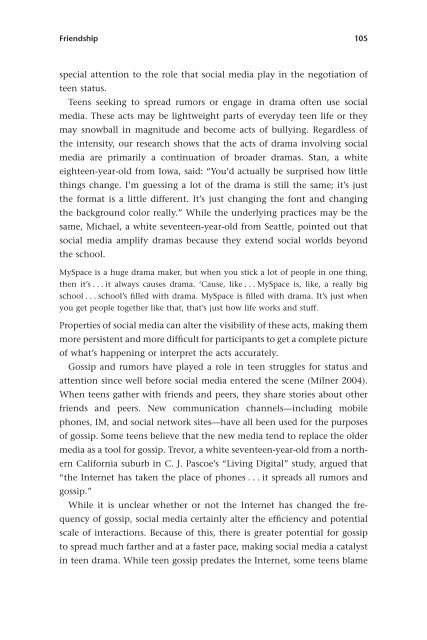- Page 2 and 3:
Hanging Out, Messing Around, and Ge
- Page 4 and 5:
HANGING OUT, MESSING AROUND, AND GE
- Page 6:
To the memory and ongoing legacy of
- Page 9 and 10:
viiiContentsBox 2.2 From MySpace to
- Page 12 and 13:
Series ForewordIn recent years, dig
- Page 14 and 15:
AcknowledgmentsThe research for and
- Page 16:
AcknowledgmentsxvFinally, we would
- Page 19 and 20:
xviiiNotes on the TextThe case stud
- Page 22 and 23:
INTRODUCTIONDigital media and onlin
- Page 24 and 25:
Introduction 3descriptive goal of d
- Page 26 and 27:
Introduction 5as how they are able
- Page 28 and 29:
Introduction 7are passive recipient
- Page 30 and 31:
Introduction 9over the digital gene
- Page 32 and 33:
Introduction 11Our work has focused
- Page 34 and 35:
Introduction 13addressing the need
- Page 36 and 37:
Introduction 15tion, has the advant
- Page 38 and 39:
Introduction 17tion are high-level
- Page 40 and 41:
Introduction 19Arjun Appadurai and
- Page 42 and 43:
Introduction 21gaming friends who d
- Page 44 and 45:
Introduction 23guidance. Among the
- Page 46 and 47:
Introduction 25struction of technol
- Page 48 and 49:
Introduction 27Chapter 1, “Media
- Page 50 and 51:
1 MEDIA ECOLOGIESLead Authors: Heat
- Page 52 and 53:
Media Ecologies 31We use the metaph
- Page 54 and 55:
Media Ecologies 33the Kaiser report
- Page 56 and 57:
Media Ecologies 35communicators.”
- Page 58 and 59:
Media Ecologies 37The distinction b
- Page 60 and 61:
Media Ecologies 39(IM), and phone c
- Page 62 and 63:
Media Ecologies 41everyday sociabil
- Page 64 and 65:
Media Ecologies 43for the complex w
- Page 66 and 67:
Media Ecologies 45to talk to her fr
- Page 68 and 69:
Media Ecologies 47cams and stuff li
- Page 70 and 71:
Media Ecologies 49Like many of the
- Page 72 and 73:
Media Ecologies 51relationship stat
- Page 74 and 75:
Media Ecologies 53She “loved thos
- Page 76 and 77: Media Ecologies 55involve finding i
- Page 78 and 79: Media Ecologies 57I just searched o
- Page 80 and 81: Media Ecologies 59Box 1.4 The Techn
- Page 82 and 83: Media Ecologies 61In chapter 7 we d
- Page 84 and 85: Media Ecologies 63for unstructured
- Page 86 and 87: Media Ecologies 65Today, Toni is an
- Page 88 and 89: Media Ecologies 67high-speed Intern
- Page 90 and 91: Media Ecologies 69anywhere, and als
- Page 92 and 93: Media Ecologies 71family, peers, cl
- Page 94 and 95: Media Ecologies 73Profile Productio
- Page 96 and 97: Media Ecologies 75It’s actually r
- Page 98 and 99: Media Ecologies 77selected and deli
- Page 100 and 101: 2 FRIENDSHIPLead Author: danah boyd
- Page 102 and 103: Friendship 81U.S. teens. The materi
- Page 104 and 105: Friendship 83production and economi
- Page 106 and 107: Friendship 85teens use social media
- Page 108 and 109: Friendship 872 say I luv u, but a l
- Page 110 and 111: Friendship 89from them. Research th
- Page 112 and 113: Friendship 91While there are plenty
- Page 114 and 115: Friendship 93Some of these messages
- Page 116 and 117: Friendship 95displayed on social ne
- Page 118 and 119: Friendship 97frequently send messag
- Page 120 and 121: Friendship 99this sets up. Melanie,
- Page 122 and 123: Friendship 101stems from a desire b
- Page 124 and 125: Friendship 103at the top. And, then
- Page 128 and 129: Friendship 107Cachi, a Puerto Rican
- Page 130 and 131: Friendship 109That said, most teens
- Page 132 and 133: Friendship 111Christo: Why do you t
- Page 134 and 135: Friendship 113ConclusionSocial medi
- Page 136: Friendship 1153. We use the term
- Page 139 and 140: 118 C. J. Pascoeit has become incre
- Page 141 and 142: 120 C. J. Pascoeto initiate and rec
- Page 143 and 144: 122 C. J. Pascoeset of norms about
- Page 145 and 146: 124 C. J. Pascoeway to “research,
- Page 147 and 148: 126 C. J. PascoeThen it’s kind of
- Page 149 and 150: 128 C. J. Pascoereadily in offline
- Page 151 and 152: 130 C. J. PascoeThese tokens are pa
- Page 153 and 154: 132 C. J. Pascoediscussion. While f
- Page 155 and 156: 134 C. J. PascoeAs Michael learned
- Page 157 and 158: 136 C. J. Pascoeangry messages dire
- Page 159 and 160: 138 C. J. Pascoeabout. So that was
- Page 161 and 162: 140 C. J. Pascoeliving in Brooklyn,
- Page 163 and 164: 142 C. J. PascoeVulnerabilityNew me
- Page 165 and 166: 144 C. J. Pascoecasualness discusse
- Page 167 and 168: 146 C. J. Pascoeneed to be taken se
- Page 169 and 170: 148 C. J. PascoeContemporary dating
- Page 171 and 172: 150 Heather A. HorstThis book focus
- Page 173 and 174: 152 Heather A. Horstin individual h
- Page 175 and 176: 154 Heather A. Horstof media incorp
- Page 177 and 178:
156 Heather A. HorstMcRobbie and Ga
- Page 179 and 180:
158 Heather A. Horsthacked onto my
- Page 181 and 182:
160 Heather A. Horst“on my confir
- Page 183 and 184:
162 Heather A. Horst(We decided to
- Page 185 and 186:
164 Heather A. HorstWhile games at
- Page 187 and 188:
166 Heather A. HorstMiguel: They ta
- Page 189 and 190:
168 Heather A. HorstBox 4.2 The Mil
- Page 191 and 192:
170 Heather A. HorstSimilarly, Lisa
- Page 193 and 194:
172 Heather A. HorstRoutines and Rh
- Page 195 and 196:
174 Heather A. Horstspend time with
- Page 197 and 198:
176 Heather A. HorstEarendil, refle
- Page 199 and 200:
178 Heather A. HorstMaking, Breakin
- Page 201 and 202:
180 Heather A. Horstenrolling in fa
- Page 203 and 204:
182 Heather A. Horstshe has learned
- Page 205 and 206:
184 Heather A. Horstsus amigas y es
- Page 207 and 208:
186 Heather A. Horststudents that a
- Page 209 and 210:
188 Heather A. HorstFigure 4.3Lynn
- Page 211 and 212:
190 Heather A. HorstAs Traviesa ack
- Page 213 and 214:
192 Heather A. Horston the generati
- Page 215 and 216:
194 Heather A. Horsttraveling on th
- Page 217 and 218:
196 Mizuko Ito and Matteo Bittantii
- Page 219 and 220:
198 Mizuko Ito and Matteo Bittantit
- Page 221 and 222:
200 Mizuko Ito and Matteo Bittantio
- Page 223 and 224:
202 Mizuko Ito and Matteo Bittantia
- Page 225 and 226:
204 Mizuko Ito and Matteo Bittantio
- Page 227 and 228:
206 Mizuko Ito and Matteo Bittanti
- Page 229 and 230:
208 Mizuko Ito and Matteo Bittanti(
- Page 231 and 232:
210 Mizuko Ito and Matteo Bittantio
- Page 233 and 234:
212 Mizuko Ito and Matteo Bittantis
- Page 235 and 236:
214 Mizuko Ito and Matteo BittantiO
- Page 237 and 238:
216 Mizuko Ito and Matteo BittantiT
- Page 239 and 240:
218 Mizuko Ito and Matteo Bittantis
- Page 241 and 242:
220 Mizuko Ito and Matteo Bittantia
- Page 243 and 244:
222 Mizuko Ito and Matteo BittantiI
- Page 245 and 246:
224 Mizuko Ito and Matteo Bittantii
- Page 247 and 248:
226 Mizuko Ito and Matteo Bittantic
- Page 249 and 250:
228 Mizuko Ito and Matteo Bittantiw
- Page 251 and 252:
230 Mizuko Ito and Matteo Bittantio
- Page 253 and 254:
232 Mizuko Ito and Matteo BittantiI
- Page 255 and 256:
234 Mizuko Ito and Matteo BittantiA
- Page 257 and 258:
236 Mizuko Ito and Matteo Bittantiw
- Page 259 and 260:
238 Mizuko Ito and Matteo BittantiP
- Page 261 and 262:
240 Mizuko Ito and Matteo Bittantir
- Page 263 and 264:
242 Mizuko Ito and Matteo Bittanti9
- Page 265 and 266:
244 Patricia G. Lange and Mizuko It
- Page 267 and 268:
246 Patricia G. Lange and Mizuko It
- Page 269 and 270:
248 Patricia G. Lange and Mizuko It
- Page 271 and 272:
250 Patricia G. Lange and Mizuko It
- Page 273 and 274:
252 Patricia G. Lange and Mizuko It
- Page 275 and 276:
254 Patricia G. Lange and Mizuko It
- Page 277 and 278:
256 Patricia G. Lange and Mizuko It
- Page 279 and 280:
258 Patricia G. Lange and Mizuko It
- Page 281 and 282:
260 Patricia G. Lange and Mizuko It
- Page 283 and 284:
262 Patricia G. Lange and Mizuko It
- Page 285 and 286:
264 Patricia G. Lange and Mizuko It
- Page 287 and 288:
266 Patricia G. Lange and Mizuko It
- Page 289 and 290:
268 Patricia G. Lange and Mizuko It
- Page 291 and 292:
270 Patricia G. Lange and Mizuko It
- Page 293 and 294:
272 Patricia G. Lange and Mizuko It
- Page 295 and 296:
274 Patricia G. Lange and Mizuko It
- Page 297 and 298:
276 Patricia G. Lange and Mizuko It
- Page 299 and 300:
278 Patricia G. Lange and Mizuko It
- Page 301 and 302:
280 Patricia G. Lange and Mizuko It
- Page 303 and 304:
282 Patricia G. Lange and Mizuko It
- Page 305 and 306:
284 Patricia G. Lange and Mizuko It
- Page 307 and 308:
286 Patricia G. Lange and Mizuko It
- Page 309 and 310:
288 Patricia G. Lange and Mizuko It
- Page 311 and 312:
290 Patricia G. Lange and Mizuko It
- Page 313 and 314:
292 Patricia G. Lange and Mizuko It
- Page 316 and 317:
7 WORKLead Author: Mizuko ItoIn her
- Page 318 and 319:
Work 297from the primary labor mark
- Page 320 and 321:
Work 299The second set of work prac
- Page 322 and 323:
Work 301ing a vehicle for some yout
- Page 324 and 325:
Work 303third of four children. Ani
- Page 326 and 327:
Work 305and classroom management, w
- Page 328 and 329:
Work 307traditional vocational trai
- Page 330 and 331:
Work 309tech and media jobs. Among
- Page 332 and 333:
Work 311online sites are closely li
- Page 334 and 335:
Work 313Figure 7.1SnafuDave comics.
- Page 336 and 337:
Work 315Go. You’re not doing anyt
- Page 338 and 339:
Work 317And so one day they got me
- Page 340 and 341:
Work 319The examples of entrepreneu
- Page 342 and 343:
Work 321educational tools or adult
- Page 344 and 345:
Work 323Altimit said that he is the
- Page 346 and 347:
Work 325Nonmarket Peer ProductionWi
- Page 348 and 349:
Work 327hours of coordinated teamwo
- Page 350 and 351:
Work 329In September 2005, KtD atte
- Page 352 and 353:
Work 331ducers. Further, these acti
- Page 354 and 355:
Work 333rooted in this extreme inte
- Page 356 and 357:
Work 335work, are creating a new me
- Page 358:
Work 33715. A “mighty strike” i
- Page 361 and 362:
340 Conclusionare evolving in tande
- Page 363 and 364:
342 Conclusionliteracies that are d
- Page 365 and 366:
344 Conclusionand tinker. It is imp
- Page 367 and 368:
346 Conclusionthe Internet, even as
- Page 369 and 370:
348 Conclusionpeople who know how t
- Page 371 and 372:
350 Conclusiondesign. Programs of t
- Page 373 and 374:
352 Conclusionoperate in the same w
- Page 376 and 377:
Appendix I: Project OverviewThe Dig
- Page 378 and 379:
Project Overview 357the population
- Page 380:
Project Overview 359U.S. census, pa
- Page 383 and 384:
362 Project DescriptionsHomes and N
- Page 385 and 386:
364 Project Descriptionsactivities
- Page 387 and 388:
366 Project Descriptions2006). Rece
- Page 389 and 390:
368 Project Descriptionssites remai
- Page 391 and 392:
370 Project Descriptionsthemselves
- Page 393 and 394:
372 Project IndexStudy’s Short Ti
- Page 395 and 396:
374 BibliographyAppadurai, Arjun. 1
- Page 397 and 398:
376 BibliographyEuropean Comparativ
- Page 399 and 400:
378 BibliographyClark, Lynn Schofie
- Page 401 and 402:
380 BibliographySystems, edited by
- Page 403 and 404:
382 BibliographyHampton, Keith. 200
- Page 405 and 406:
384 BibliographyNewcomb, and W. W.
- Page 407 and 408:
386 BibliographyKaraganis, Joe. 200
- Page 409 and 410:
388 BibliographyLevine, Judith. 200
- Page 411 and 412:
390 BibliographyMatsuda, Misa. 2007
- Page 413 and 414:
392 BibliographyOkabe, Daisuke, and
- Page 415 and 416:
394 Bibliographyand Catherine T. Ma
- Page 417 and 418:
396 BibliographyStrasburger, Victor
- Page 419 and 420:
398 BibliographyWhite House, The. 1
- Page 421 and 422:
400 IndexAntin, Judd, 46, 62, 63, 8
- Page 423 and 424:
402 IndexCollective action, 14, 219
- Page 425 and 426:
404 IndexEducation (cont.)ecology o
- Page 427 and 428:
406 IndexGames (cont.)Grand Theft A
- Page 429 and 430:
408 IndexHarassment, online, 107-10
- Page 431 and 432:
410 IndexKnowledge (cont.)productio
- Page 433 and 434:
412 IndexMobilitymedia use and, 163
- Page 435 and 436:
414 IndexPhotoshop, 58, 59, 63, 224
- Page 437 and 438:
416 IndexSafety, 91, 97, 126, 144-1
- Page 439 and 440:
418 IndexTime (cont.)routines and,





